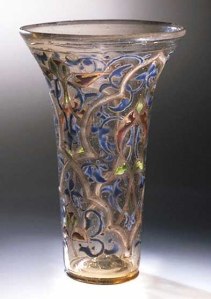Cumbria is home to a number of ‘lucks’, or drinking vessels that are believed to protect a home and its residents from ill fortune. Perhaps the most famous is the Luck of Edenhall.
Edenhall is a small village near Langwathby in the Eden valley, and it was the seat of the Musgrave family for several hundred years.
The Luck is a glass beaker, with blue, green, red and white enamel and gilding, in a case bearing the initials, ‘IHS’ – the Greek rendering of Jesus. The glass is believed to be of Syrian or Egyptian origin, and it was made some time around the 13th or 14th century; a similar one was gifted to the Cathedral of Douai in 1329. The combination of location and date strongly suggest that the glass was brought back from the Crusades. Continue reading


